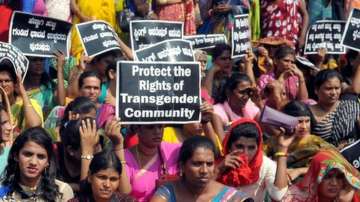A BJP MP-headed parliamentary panel has criticised the government's draft transgender bill for not addressing important civil rights issues such as marriage and divorce among members of the community. The Parliamentary Standing Committee on Social Justice And Empowerment in its report tabled in the Lok Sabha on Friday said transgenders "remain at risk of criminalisation under Section 377 of the IPC".
The IPC section criminalises any "unnatural" sexual contact by a person including acts of homosexuality.
The report comes at a time when the BJP-led NDA government is under pressure to decriminalise homosexuality.
The draft Transgender Persons (Protection of Rights) Bill 2016 "does not refer to important civil rights like marriage and divorce, adoption among others which are critical to transgender persons' lives, wherein many are engaged in marriage-like relations without any legal recognition from the state", it said.
The panel headed by BJP Lok Sabha member Ramesh Bais said the bill is "silent" on granting reservation to transgenders under the socially and educationally backward classes category as directed by the Supreme Court.
It suggested that the proposed legislation "must at the very least" recognize transgenders' rights to partnership and marriage" and that they should have the option to choose their gender independent of surgery or hormones.
The draft bill defines a transgender as someone who is neither wholly female nor wholly male, a combination of female or male or neither female nor male and whose sense of gender does not match with the gender assigned to the person at the time of birth.
The panel also felt that the definition of a transgender in the draft bill is in stark contrast to global developments, where transgenders have been granted the right to self determine and to seek benefits according to such identity.
"It not only violates fundamental rights to equality, dignity, autonomy, but also freedom of transgender persons guaranteed under Article 14, 19 and 21 of the Constitution," it said.
The definition is "unscientific and primitive and based on biological attributes". It fails to recognise that many persons are born with ambiguous or typical sexual organs, whether external or internal, and identify themselves as male, female or transgender, it said.
The committee also recommended that a definition of "discrimination" be included in Chapter I of the bill "which must cover a range of violations that transgenders face".
It also asked the central and state governments and the civil society to adopt measures for creating awareness about transgenders.
A historic shift is underway, transgender are not alone in their struggle for the end of violence and discrimination, the panel said in the report.
"While there is no shame in being a gay, lesbian, bisexual, transgender or intersex or even straight - there is shame and dishonour in being a homophobe, a transphobe and a bigot," it said.
